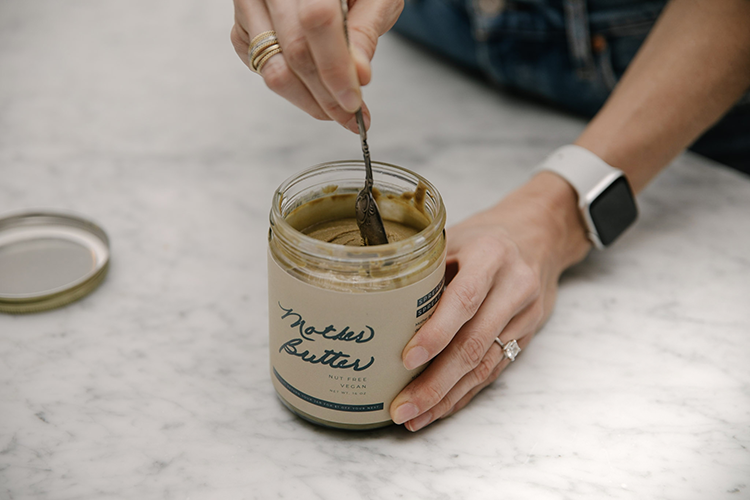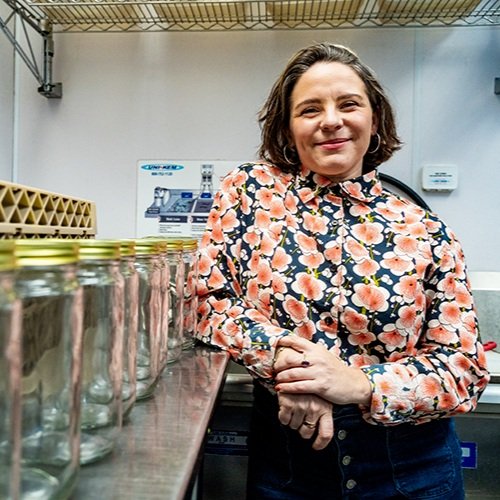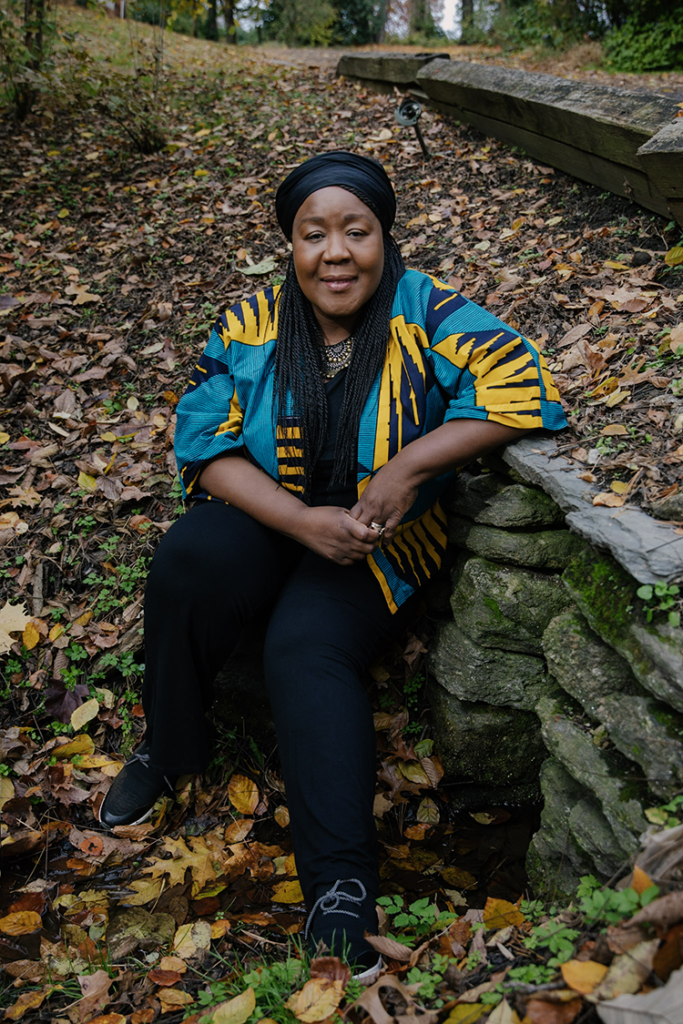On February 9, Kensington resident Kristin Dudley texted her mother Pamela without context:
“Hey mom—could you do something for me? Write the words ‘Mother Butter’ on a piece of paper, one time in cursive, the next just regular—take a pic and send it to me?”
“Ok … ” her mother responded.
Dudley, a self-described “serial entrepreneur,” wanted the logo of her fledgling company Mother Butter to be as organic and unassuming as its model product—a velvety, golden-brown seed butter that combines six ingredients, a little science and lots of maternal inspiration.
A trained fashion designer, Dudley had been thinking more about nutrition and the body during her pregnancy in 2018. She began dreaming about a snack line that would match the varying nutritional needs throughout a person’s fertility and menstruation journeys.
She took her initial idea for menstrual cycle-driven snacks to the Drexel University Food Lab, a food product design and culinary innovation lab developed and led by Jonathan Deutsch, a professor in the Food and Hospitality Management Department.
The lab, which had recently merged with Drexel’s Department of Nutrition Sciences, focuses on sustainability and does a lot of work with startups featuring healthier, more environmentally friendly food products, says Deutsch, who has helped notable products like Soom, a tahini company, and Saint Lucifer Spice Company.
When a client comes in with an idea, the lab handles the consumer research and culinary development side of the project, through qualitative and ethnographic work like focus groups and surveys, Deutsch says. It is a mostly student-run operation.
Mother Butter’s label uses Dudley’s own mother’s handwriting.
“It’s a mixture of art and science,” Deutsch says. “People don’t know what they don’t know. If I say to you, ‘What do you want for lunch today?’ … you think in terms of what you can imagine … But if I say, ‘I created this new dish, I think you’ll like it’ … that’s sort of what we do.”
Typically, the best projects are open-minded ones, he adds, pitched without boundaries. Dudley’s was one such idea; she wanted to do something related to women’s health and seeds, but was flexible with the outcome. Which was good, because her inceptive idea—a snack line that correlated with the menstrual cycle—was quickly shot down by consumer trials as being too complicated and conceptual, requiring too much explanation.
“You have about five seconds to explain what this product is and why they need it,” Deutsch explains. “The typical consumer doesn’t read the back of the cereal box in the store.” Decisions are instantaneous about whether something goes in the cart or not, he adds, so the less messaging the better.
“So we kept going, and trusted the process,” Dudley says. They learned from the Nutrition Sciences Department that there is not much research done on how diet affects fertility and reproduction, but they did encounter a study about the Mediterranean diet, its emphasis on seeds and their benefits for women’s vitality and fertility.
“That was sort of our key to keep pressing forward,” Dudley says.

There is a lot of mythologizing when it comes to healthy nutrients. Some is rooted in evidence, some is not, Deutsch says. “We wanted to design something that was evidence-based, but also could be a multi-occasion food. Designed for women. Enjoyed by anyone.”
“Part of my journey here is leaning into motherhood.”
—Kristin Dudley, Mother Butter founder
They talked to a lot of women in focus groups about their snacking habits and what they look for. Two themes popped up—the first, a need for satiety, especially in the late afternoon. The second was “guilty pleasure activities,” particularly a proclivity toward peanut butter and late-night Nutella cravings.
“We leveraged those ideas and met in the middle of healthy and indulgent,” says Deutsch. “Good ideas are easy, but to get them to be adopted [into someone’s lifestyle], that’s the art.”
They continued the process, came up with 50 different snack concepts and brought some of them to a focus group. All along they had been using a seed-based butter as a binding agent for the snacks.
At the last minute, toward the end of their 12-week trial period, Dudley decided to pull out the seed butter and have the group taste it on its own. They loved it.
“Am I about to be the seed butter lady?” Dudley remembers asking herself. “And it all fell into place.”
Composed of four seeds—pumpkin, sunflower, flax and sesame—and a little coconut sugar, this seed butter was the wholesome, filling and nutritious snack they had been searching for.
The four seeds involved are associated with “seed cycling,” a method of eating different seeds at different times of the month to regulate estrogen and progesterone, thus easing the symptoms associated with menopause and menstruation. The trick is that the seeds must be ground up.
There is plenty of anecdotal evidence for seed cycling, but not much scientific, even though the seeds’ nutritional value (which includes zinc, protein, iron, omega-3 fatty acids, magnesium, folate and fiber) has been well established.
Dudley delivers Mother Butter to customers’ homes, and collects and reuses glass jars.
Dudley realized that the product would serve the health of women as well as her community.
The trial and error continued, even after the product was honed in on. The color especially went through a lot of tweaks, from brownish, to beige, to the nutty, slightly olive hue it is currently. The texture was also a struggle. The initial work was done in Deutsch’s home kitchen, using his personal blender, and it wasn’t smooth butter. Dudley eventually acquired a powerful commercial blender that gives the butter its creamy stick-to-the-roof-of-your-mouth smoothness.
“Mother Butter just seems to resonate,” Deutsch says. They found that secret sauce, he says, where a consumer can look at it and recognize, “Okay, it’s like peanut butter, but it’s made from seeds, and it’s better for me in some way,” in under a couple seconds.
I asked Deutsch, gastronome that he is, what makes this seed butter stand apart from others on the shelves. He said it’s lightly sweetened with coconut sugar, which makes Mother Butter a pleasing indulgence as well as a butter. An added benefit is the “health halo” coconut sugar wields on a label, he says.
“The majority of the seed butters [on the market] were developed to replace peanut butter—Mother Butter was not. It’s its own animal,” Dudley adds.
Deutsch agrees. “I’m really proud of where this came from,” he says, “which was some sort of vague, date-nut-seed-cluster-cookie-type snack thing … all the way through. The women who gave us feedback were really instrumental. I don’t think there’s anything quite like it. I think that is why we do the kind of work we do.”
I was curious to taste it for myself. For some, Dudley says, it’s reminiscent of halva, for others it’s tahini or pumpkin.
“You’ll have to see for yourself,” she said.
For me, the flavor was nostalgic. And then I remembered where I’d tasted something like it—the salty roasted pepitas my mother would make with our harvested pumpkins. As a recently postpartum mother myself, a product that is wholly satisfying, that will feed both your body and your baby and do it quickly and conveniently between diaper changes is hard to come by.
Dudley had visions of becoming a modern-day milk delivery person for her neighbors, delivering the seed butter to people’s homes and collecting and reusing their glass jars. The idea took off, especially for those with peanut and nut allergies, and for families with kids who can’t bring nut butters to school.
Megan Vetri, a mother of three, dance movement therapist and certified health coach, is a regular customer of Dudley’s.
“As a 43-year-old woman, I’m always looking for ways to balance my hormones and meet important nutritional needs,” she says. “The ingredients in Mother Butter are incredibly nourishing for mothers and for general female hormonal health. I also love supporting small local businesses, particularly those that are female-owned.”
The product was launched on Mother’s Day 2021. Dudley has a handful of subscribers, and does indeed deliver and pick up their glass jars. She also pops up at farmers markets, and can be found on six shelves, including Riverwards Produce Market, REAP Mini Mart, Forin Café and the South Philly Food Co-op.
She has plans to expand Mother Butter into other healthy snacks, and adding additional flourishes to the original recipe, like chocolate.
Dudley has hired one part-time employee who is also a mother. Her long-term goals for the company include having a parent-friendly work environment, one that eschews the traditional 9-to-5 and has more reasonable hours for parents with kids in school, such as shifts from 10 a.m. to 2 p.m.. She is in the process of moving her kitchen into the Old Pine Community Center, a space that also offers programs for children, further aligning with her desire to have a space for childcare for her employees.
In the meantime, she wants the company to remain informed by multigenerational storytelling and wisdom. Her social media shares stories of women, particularly grandmothers, who have inspired her and her brand, and whose handwriting has also been used on the Mother Butter label, though the main logo remains Dudley’s own mother’s work.
Dudley emphasizes that, for her, the company is as much about these women as it is about seed butter.
“Part of my journey here is leaning into motherhood,” she says. “Leaning into being a mother and also being a mother to a business. Mother Butter is my outlet and my art. My way of caring for fellow mothers and fellow caretakers, and processing it all myself.









